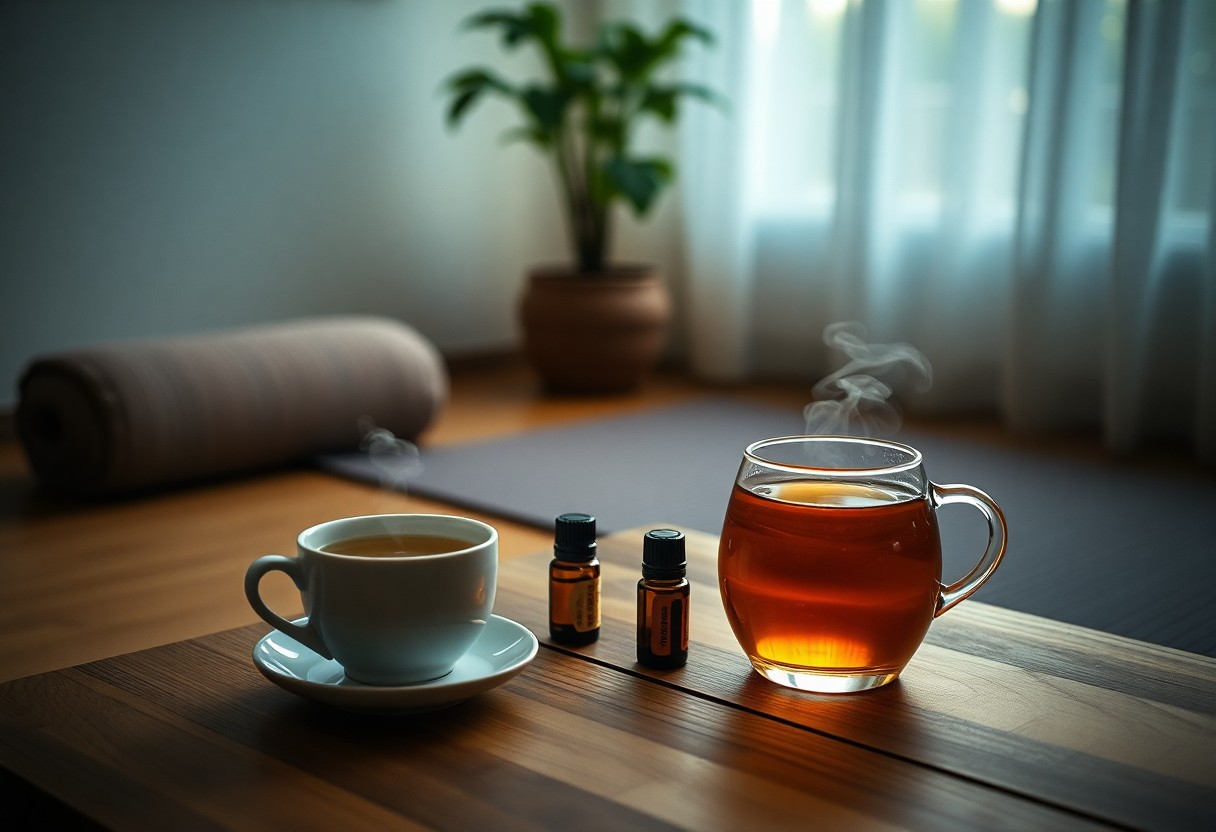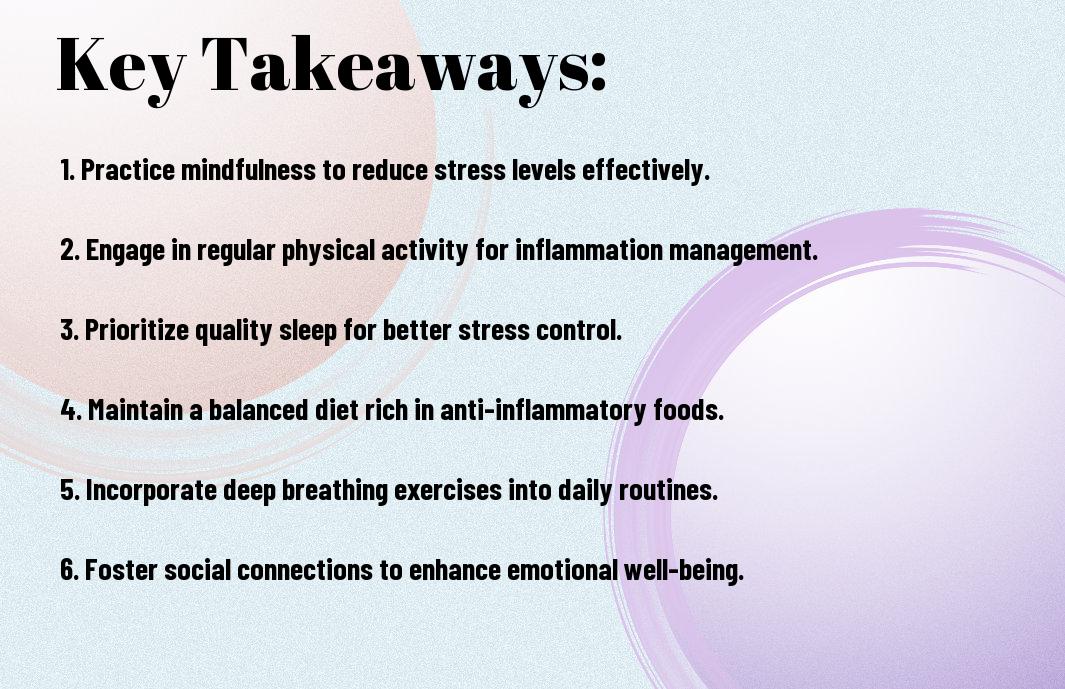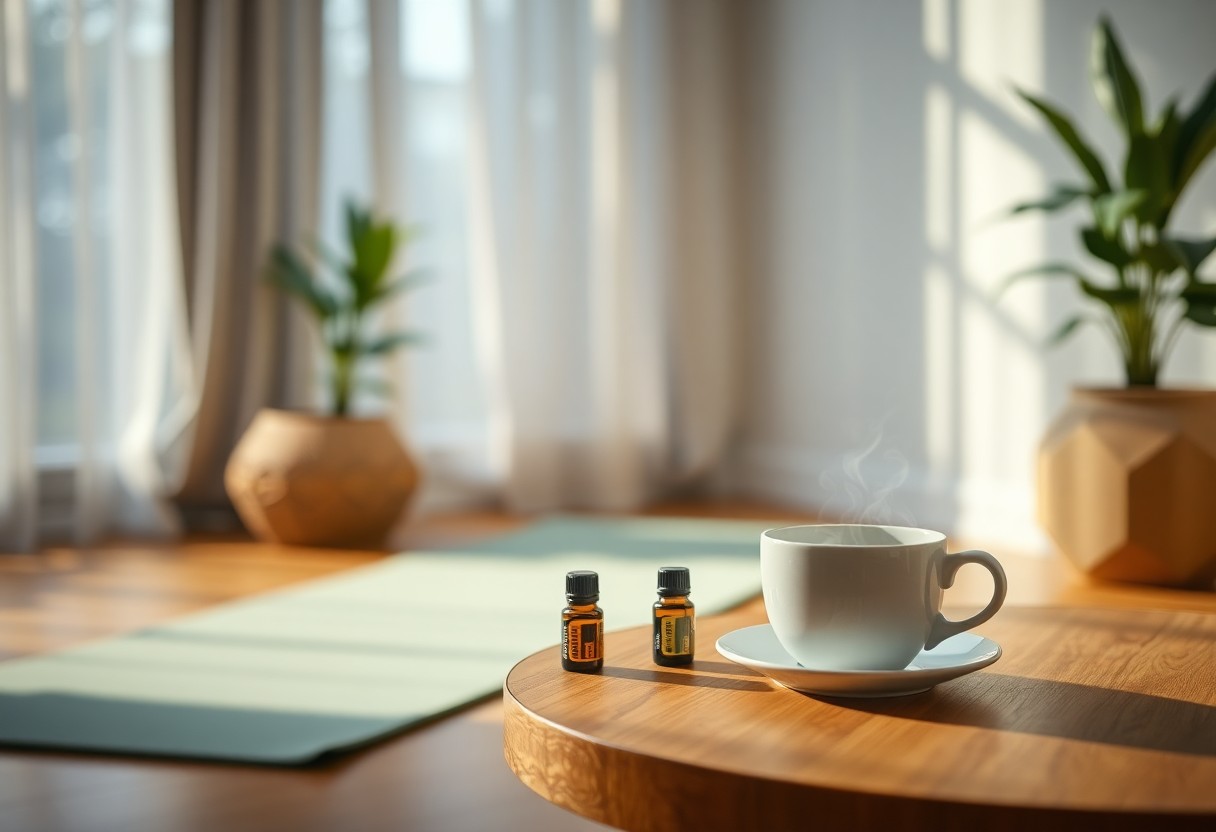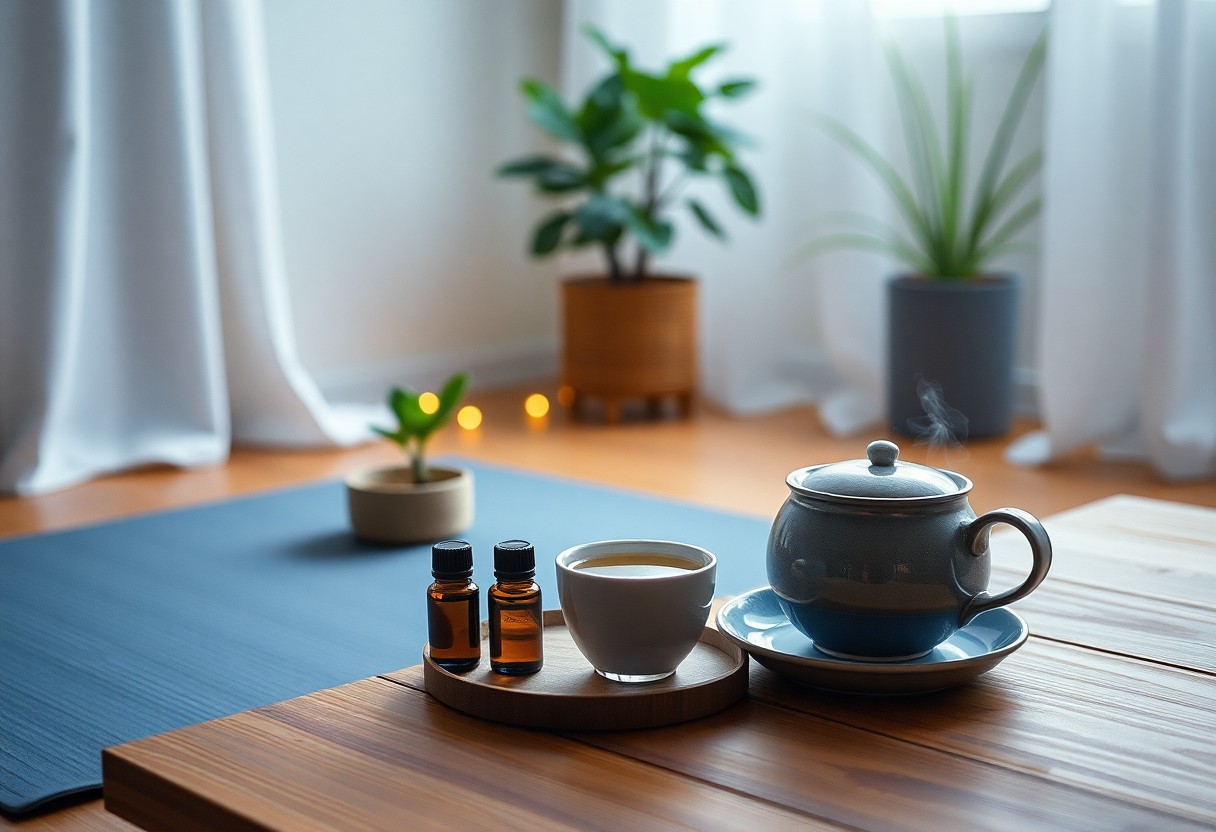As you navigate your daily life, chronic stress can have a devastating impact on your overall well-being, leading to inflammation and various health issues. You may experience anxiety and fatigue as a result. However, by implementing effective stress management techniques, you can significantly reduce inflammation and improve your quality of life. You will learn how to protect your body from the damaging effects of stress and promote overall health in this blog post.

Key Takeaways:
To effectively manage stress and combat inflammation, consider the following points:
- Engage in Regular Exercise to reduce stress levels and promote overall well-being, as physical activity has been shown to decrease inflammation in the body.
- Practice Mindfulness Techniques, such as meditation and deep breathing, to help calm the mind and reduce stress-induced inflammation.
- Get adequate Sleep each night, as sleep deprivation can lead to increased inflammation and stress levels, making it more challenging to manage stress.
- Focus on consuming a Balanced Diet rich in fruits, vegetables, and whole grains, which can help reduce inflammation and provide the body with necessary nutrients to combat stress.
- Set aside time for Relaxation Activities, such as reading or spending time in nature, to help reduce stress levels and promote a sense of calm, ultimately reducing inflammation in the body.

Identifying Stress Triggers
A key step in managing stress is to identify the triggers that cause it. You need to understand what sets off your stress response, whether it’s a specific situation, person, or environment. By being aware of your stress triggers, you can take steps to mitigate their impact and develop strategies to cope with them in a healthy way.
Recognizing Physical Signs
Along with emotional awareness, you should also pay attention to your physical signs of stress, such as tension headaches or fatigue. These physical symptoms can signal that you are under stress and need to take action to manage it.
Emotional Awareness
Beneath the surface of your daily life, you may be experiencing anxiety or overwhelm that contributes to stress. You should take time to reflect on your emotions and identify what may be causing you to feel this way.
Triggers such as major life changes or traumatic events can have a significant impact on your emotional state, leading to increased stress and inflammation. As you become more aware of your emotional triggers, you can start to develop effective coping mechanisms, such as mindfulness or meditation, to help manage your stress and reduce inflammation. By taking control of your emotional awareness, you can take the first step towards a healthier and happier life.
Breathing Techniques for Relaxation
Now, you can manage stress and inflammation by incorporating breathing techniques into your daily routine. Visit 6 Ways to Decrease Stress-Induced Inflammation to learn more about reducing inflammation. By practicing deep breathing exercises, you can help reduce stress levels and promote relaxation.
Diaphragmatic Breathing
Along with other techniques, diaphragmatic breathing can help calm your mind and body. This type of breathing engages your diaphragm, allowing for fuller breaths and promoting relaxation.
Alternate Nostril Breathing
Against the clock, you can practice alternate nostril breathing to calm your nervous system. This technique involves closing one nostril and breathing through the other, then switching to promote balance and harmony in your body.
Further, alternate nostril breathing has been shown to have a profound impact on both physical and mental health. By practicing this technique, you can help reduce stress and anxiety, while also improving your overall well-being. As you practice, focus on your breath and let go of any distracting thoughts, allowing yourself to fully relax and unwind.

Mindfulness and Meditation
Many studies have shown that mindfulness and meditation can help reduce stress and inflammation in your body. By practicing mindfulness, you can become more aware of your thoughts and emotions, allowing you to manage stress more effectively. Regular meditation can also help lower your cortisol levels, leading to a decrease in inflammation.
Guided Meditation
Any form of meditation can be beneficial, but guided meditation can be especially helpful for beginners. You can find guided meditation recordings online or through mobile apps, which will walk you through the process and help you stay focused on your breath and relaxation.
Mindful Movement
Mindfully, you can practice movement to reduce stress and inflammation. Activities like yoga and tai chi combine physical movement with mindfulness techniques, helping you stay present and focused while also improving your overall health.
In fact, as you practice mindful movement, you’ll start to notice improvements in your mental and physical well-being. You’ll be better able to manage stress, and your body will be less likely to experience chronic inflammation, which can lead to serious health problems if left unchecked. By incorporating mindful movement into your daily routine, you can take a significant step towards improving your overall health and reducing inflammation.

Exercise and Physical Activity
Keep in mind that regular exercise can help reduce inflammation in your body. You can find 9 healthy eating tips that can help reduce inflammation to complement your physical activity. By incorporating exercise into your daily routine, you can significantly reduce your stress levels and inflammation.
Yoga and Stretching
Around the same time, you can also try yoga and stretching exercises to help manage stress and inflammation. You can start with simple stretches and poses to help improve your flexibility and reduce muscle tension.
Cardiovascular Exercise
By engaging in cardiovascular exercises, such as running or cycling, you can help boost your mood and reduce stress levels.
But what’s more important is that cardiovascular exercise can help lower your risk of chronic diseases, such as heart disease and diabetes, which are often linked to high inflammation levels. As you continue with your exercise routine, you’ll start to notice positive changes in your overall health and wellbeing, including reduced inflammation and improved mental health.
Nutrition and Diet
Unlike other stress management techniques, dietary changes can have a significant impact on reducing inflammation in your body. You can make informed choices to help alleviate stress and inflammation through your diet.
Anti-Inflammatory Foods
Prior to making any changes, consider incorporating anti-inflammatory foods into your diet, such as omega-3 rich fish and turmeric, which can help reduce inflammation and promote overall well-being, allowing you to better manage stress.
Hydration and Gut Health
Betwixt the various aspects of nutrition, hydration and gut health play a significant role in managing stress and inflammation, as dehydration can exacerbate inflammation, and a healthy gut microbiome is vital for a strong immune system, enabling you to cope with stress more effectively.
Further, you should be aware that poor hydration can lead to increased cortisol levels, making you more susceptible to stress, while a balanced gut microbiome can produce anti-inflammatory compounds, helping to mitigate the negative effects of stress on your body, and allowing you to manage inflammation more efficiently, which is vital for overall health.
Sleep and Recovery
For optimal health, getting enough sleep is imperative to combat inflammation, as learning about Six Keys to Reducing Inflammation can help you understand. When you don’t get enough sleep, your body produces inflammatory chemicals, which can lead to various health issues.
Establishing a Sleep Routine
Above all, you should prioritize establishing a consistent sleep schedule to help your body get into a healthy sleep-wake cycle. By going to bed and waking up at the same time every day, you can improve the quality of your sleep and reduce stress and anxiety.
Creating a Relaxing Environment
Below the surface, a peaceful sleep environment is imperative for a good night’s sleep. You can create this by making your bedroom a dark, quiet, and cool space, ideal for relaxation and sleep.
Even with a consistent sleep routine, you may still struggle with sleep if your environment is not conducive to relaxation. To create a relaxing atmosphere, consider using calming colors, soothing music, and aromatherapy to help you unwind before bed, ultimately reducing inflammation and improving your overall health.
Final Words
Ultimately, you now have various ideas for managing stress to combat inflammation. You can incorporate these strategies into your daily life to reduce your stress levels and alleviate inflammation. By implementing these techniques, you will be better equipped to protect your overall health and wellbeing. Your ability to manage stress will have a positive impact on your body, allowing you to maintain a healthy balance and reduce the risk of inflammation-related diseases.
FAQ
Q: What are some effective ideas for managing stress to combat inflammation?
A: Managing stress is crucial to combat inflammation, and some effective ideas include practicing mindfulness techniques such as meditation and deep breathing exercises, engaging in regular physical activity like yoga or walking, and getting adequate sleep each night. Additionally, setting realistic goals and priorities, taking regular breaks, and seeking support from friends, family, or a therapist can also help reduce stress levels and subsequent inflammation.
Q: How does exercise help in reducing stress and inflammation?
A: Exercise is a natural stress-reliever and anti-inflammatory agent. Regular physical activity helps to reduce stress hormones like cortisol and adrenaline, while also releasing endorphins, which are chemicals that improve mood and reduce pain. Furthermore, exercise can help to improve sleep quality, boost self-esteem, and enhance overall well-being, all of which can contribute to reduced inflammation and improved overall health.
Q: What role does diet play in managing stress and inflammation?
A: A healthy diet plays a significant role in managing stress and inflammation. Eating a balanced diet rich in whole foods, fruits, vegetables, and omega-3 fatty acids can help to reduce inflammation and promote overall health. Additionally, avoiding or limiting processed and sugary foods, which can trigger inflammation, is also important. Staying hydrated by drinking plenty of water and limiting caffeine and alcohol intake can also help to reduce stress and inflammation.
Q: Can mindfulness and relaxation techniques really help to reduce stress and inflammation?
A: Yes, mindfulness and relaxation techniques such as meditation, deep breathing, and progressive muscle relaxation can be highly effective in reducing stress and inflammation. These techniques help to calm the mind and body, reducing the production of stress hormones and promoting relaxation. Regular practice can also help to improve mood, reduce anxiety and depression, and enhance overall well-being, all of which can contribute to reduced inflammation and improved health.
Q: How can getting enough sleep help to combat stress and inflammation?
A: Getting enough sleep is crucial for managing stress and inflammation. During sleep, the body repairs and regenerates damaged cells, builds bone and muscle, and strengthens the immune system. Lack of sleep can disrupt the body’s natural balance, leading to increased stress hormones and inflammation. Aim for 7-9 hours of sleep per night and establish a consistent sleep routine to help regulate stress and inflammation, and promote overall health and well-being.



